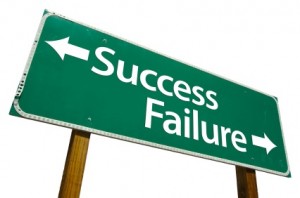 The most successful people I’ve worked with are incredibly adept at navigating those moments of mental devastation we call failure.
The most successful people I’ve worked with are incredibly adept at navigating those moments of mental devastation we call failure.
For anyone striving to achieve something big, great or new, failure is an inevitable part of the process of striving for success. It’s part of learning and growing and while it hurts momentarily, successful professionals process the experience in a very different fashion than those who are more easily derailed.
Here are some of my own lessons learned from observing successful professionals navigate their own momentary failures.
5 Constructive Responses to Professional Failure:
1. Look inward at yourself instead of outward seeking to deflect responsibility. While many of us immediately point to external factors to blame for our failures, successful professionals tend to look inward at their own thinking. Instead of competition or the failure of others to execute or uncooperative customers, they take a more clinical approach with questions such as: What did I miss? What did I fail to consider? Where did my assumptions break down? Why was I wrong about the expected outcome?
2. Own the failure publicly. Closely related to number 1 above, stand up and say, “I failed.” While you might be disappointed in yourself for missing something, you shouldn’t be embarrassed to admit having failed. If it was a team effort and you were in charge of the team, it’s on you, not the team. Don’t attempt to dodge or deflect responsibility. You’ll destroy your credibility as a leader and as a professional.
3. Play the long game. View failure in the context of one step in a process, not a final outcome. Whether it’s misfire on a project or a failed strategy or a job that ended abruptly at the invitation of your employer, view the setback as temporary…as momentary. Process, adapt and keep moving, you’ve got a long way to run.
4. Don’t let a failed effort define who you are as a professional or a person. I can’t over-emphasize this point. Those who struggle with failure amplify the size, scope and importance of the event in their minds. They begin to equate failure with their self-view as professionals and as individuals. This is a toxic mental model…that like concrete, once it sets is difficult to remove. When you begin to lose self-confidence and operate more from fear than the drive to succeed, you’ve set yourself up for failure in the long game. Fight this negative self-talk.
5. Limit time spent licking wounds. One of the key behaviors of those who successfully navigate these uncomfortable career moments is a quick conversion of disappointment and frustration into positive action. Our natural inclination is to linger indefinitely in failure mode, yet the healthy response is to bury it, mourn it and then move on.
The Bottom-Line for Now:
There are few things more critical to your long-term professional success and mental health than learning to navigate through setbacks. While the behaviors suggested above are easy to write about and difficult to manifest in those awkward moments, they are learned behaviors that can be practiced and perfected. In a career focused on growing teams, learning to lead effectively and building businesses or striving to realize a mission, you will inevitably stumble. It’s what you do at that point in time that determines your future success.
—
Don’t miss the next Leadership Caffeine-Newsletter! (All new subscriber-only content!) Register here
For more ideas on professional development-one sound bite at a time, check out: Leadership Caffeine-Ideas to Energize Your Professional Development.
New to leading or responsible for first time leaders on your team? Subscribe to Art’s New Leader’s e-News.
An ideal book for anyone starting out in leadership: Practical Lessons in Leadership by Art Petty and Rich Petro.






Leave A Comment